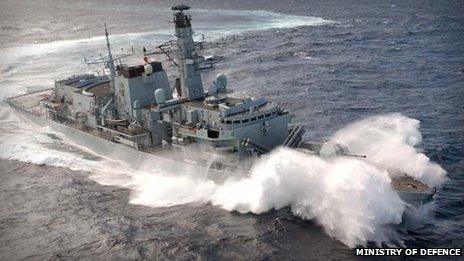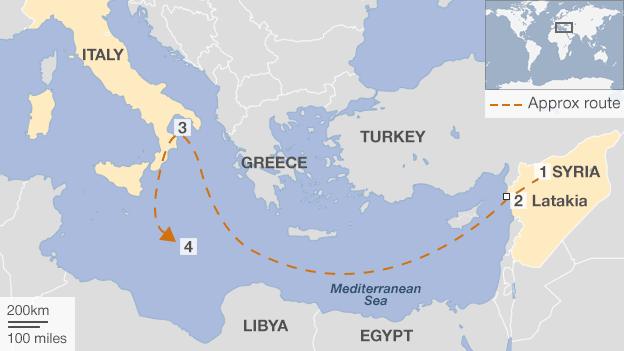William Hague: British warship to aid Syria chemical weapons disposal
- Published
William Hague: "The situation on the ground is appalling and getting worse"
British warship HMS Montrose is to join a convoy transporting the first consignment of chemical weapons from Syria, William Hague has said.
The foreign secretary hailed the disposal of Syria's chemical weapons stockpile as a "strong example of international cooperation".
He confirmed that the UK would also assist US efforts to "neutralise" the most dangerous material.
But he warned that securing an end to the conflict was still "challenging".
Syria agreed to destroy its chemical weapons in a deal brokered by the US and Russia last year.
It followed international outrage when rockets filled with the nerve agent sarin were fired at three towns in the Ghouta agricultural belt around the Syrian capital, Damascus, on 21 August.
Hundreds of people were killed in the attacks. Western powers said only Syrian government forces could have carried out the assault, but President Bashar al-Assad blamed rebel fighters.
In a Commons statement, the foreign secretary said the situation on the ground in Syria was "appalling and getting worse", highlighting recent "sickening reports of innocent people dying of malnutrition".
The Assad government's bombardment of sites like Aleppo with "deliberately indiscriminate" barrel bombs constituted "yet another war crime", he told MPs.
"Assad's brutality is the best recruiting tool the extremists have," Mr Hague continued, while "the longer the conflict continues the greater the consequences will be for regional peace and security".
'Greatest proliferation concern'
But he added: "One area in which progress is being made is the destruction of Syria's chemical stocks.
"The first consignment of the most dangerous chemicals has now left Syria after a short delay caused by intense fighting and poor weather.
"The Syrian regime must ensure that the remaining material is transported to the port as quickly as possible to ensure that all chemicals can be eliminated by the end of June.
"The disposal of Syria's chemical stockpile is a strong example of international cooperation. Italy, the US, Russia, Germany, Denmark, Norway, Finland and China are all making important contributions.
"A Royal Navy ship, HMS Montrose, is about to join the escort of the Danish and Norwegian vessels transporting the chemical stocks from Syria."

HMS Montrose is a type 23 Frigate, originally designed to deal with the Soviet submarine threat
He also confirmed the UK would "provide specialist equipment for use on board the US vessel where the material of the greatest proliferation concern will be neutralised".
'Hope amidst the death'
Mr Hague concluded: "We will continue to intensify our efforts to reach a political settlement to save lives and to protect our own security.
"It is only through a political resolution can the conflict be brought to an end."
Mr Hague said the start of further peace talks in Geneva on 22 January - known as Geneva II - would be "an important step".
He added that the government had "no illusions about how difficult and challenging a process this is likely to be, we will do everything possible with other nations to help it succeed".
For Labour, shadow foreign secretary Douglas Alexander agreed that the disposal of Syria's chemical weapons stockpile "offers us a point of hope amidst the death and destruction still being witnessed in the country".
"The government will have our support in the coming days in its efforts to secure real and substantial progress in Geneva next week towards a political settlement that ends the humanitarian suffering of the Syrian people," he added.
Mr Alexander welcomed the UK's provision of aid funding to the region, which Mr Hague said had now reached £500m, calling it "the largest sum ever committed to a single crisis".
But he urged the government to press other countries to follow through on their own aid commitments to those suffering as a consequence of the Syrian crisis.
The first consignment of toxic chemicals left Syria on a Danish ship early last week.
It is travelling to Italy, where it will be loaded onto a US Navy ship and shipped to international waters for destruction in a specially created titanium tank on board.
How the plan will unfold

1. The Syrian authorities are responsible for packing and safely transporting the chemical weapons from 12 sites across the country to the port of Latakia. Russia has supplied large-capacity and armoured lorries, while the US has sent container drums and GPS locators.
2. Russia will provide security for loading operations at Latakia, for which the US has supplied loading, transportation and decontamination equipment. China has sent 10 ambulances and surveillance cameras, and Finland an emergency response team in case of accidents.
3. Denmark and Norway are providing cargo ships and military escorts to take the chemicals to an as yet unnamed port in Italy. Russian and China will also provide naval escorts.
4. In Italy, the "most critical" chemical agents will be loaded onto the US Maritime Administration cargo ship, MV Cape Ray, to be destroyed by hydrolysis in international waters. Less-toxic chemicals will be shipped by Norwegian and Danish vessels for disposal at commercial facilities.
- Published9 January 2014
- Published16 January 2014
- Published22 October 2013
- Published17 October 2013